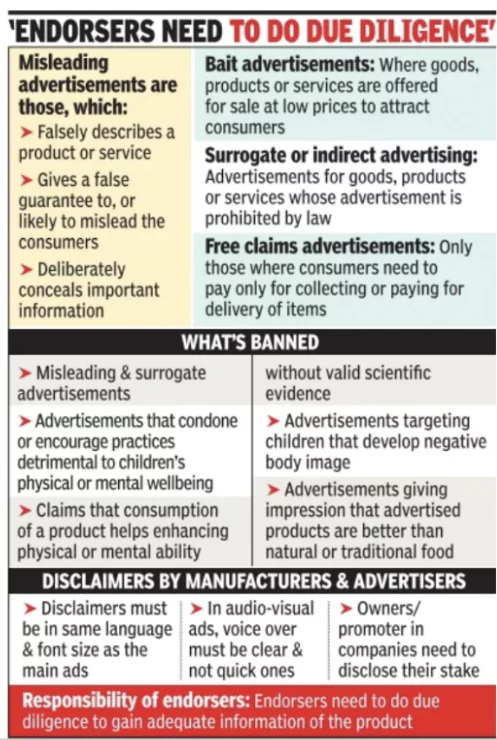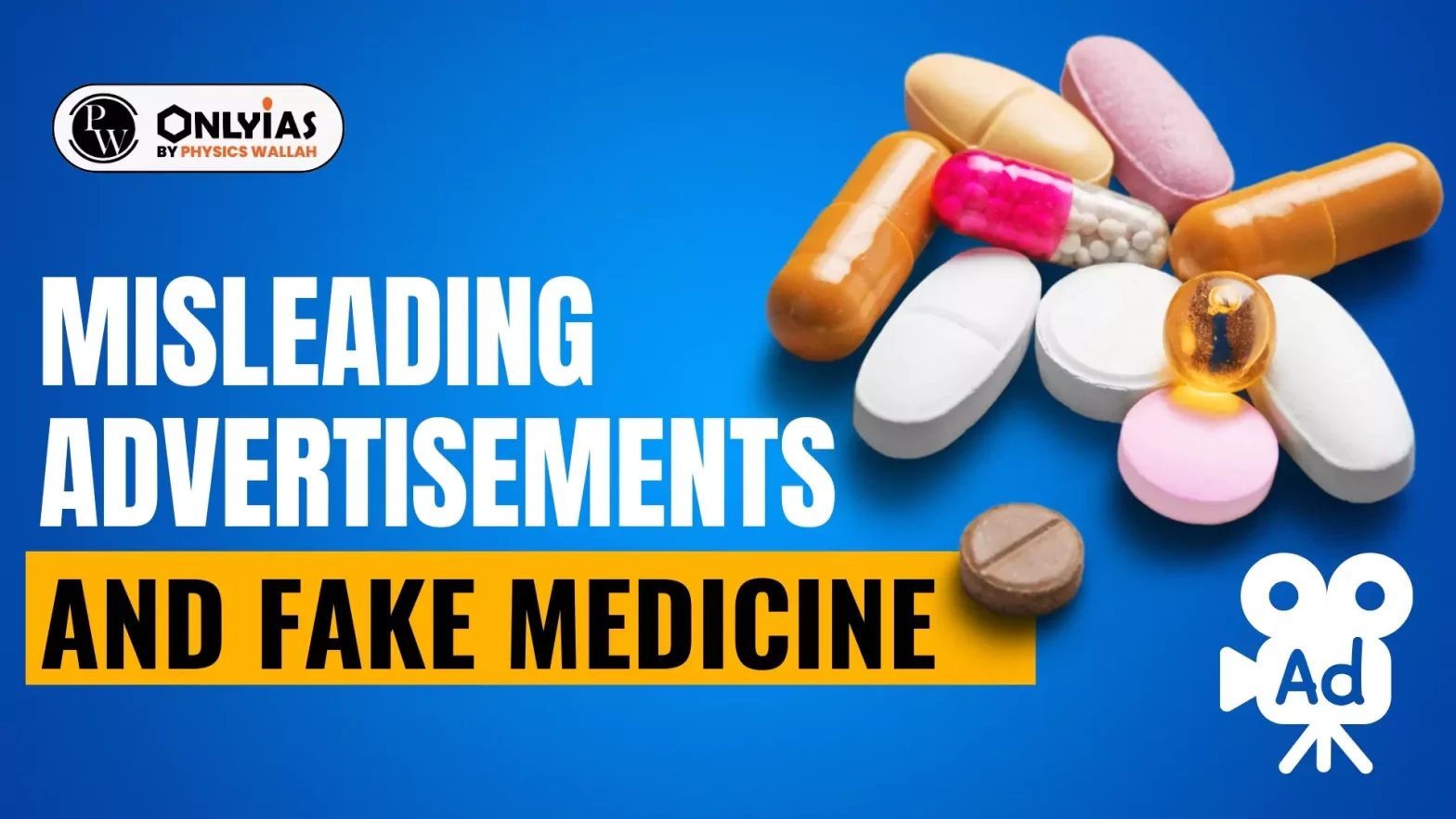Recently, the Supreme Court temporarily stayed a recent notification issued by the AYUSH Ministry on the basis of misleading advertisement, in which Rule 170 of the Drugs and Cosmetics Rules, 1945 was “omitted”.
Background of the Issue of Misleading Advertisements
The Supreme Court has been hearing the pleas on allegations of misleading advertisements since early this year.
- Initial Concerns: On March 15, 2018, the Parliamentary Standing Committee on Health and Family Welfare, raised concern about misleading advertisements in its 108th Report.
- Introduction of Rule 170 under the Drugs and Cosmetics Rules 1945: On December 21, 2018, the Ayush ministry issued a notification introducing Rule 170.
- Mandates of the Rule 170 under the Drugs and Cosmetics Rules 1945:
- No manufacturer or their agent could advertise Ayurveda, Siddha or Unani (ASU) drugs for the use of diagnosis, cure, mitigation, treatment or prevention of any disease, disorder, syndrome or condition.
- For advertisements not disallowed, manufacturers must secure a Unique Identification number from the State Licensing Authority or Drug Controller.
- Legal Challenges and Stay on the Rule:
- The Delhi High Court was the first to stay the rule on January 15, 2019.
- Similarly, the Bombay High Court granted a stay on February 11, 2019, and the Kerala High Court granted a stay on April 29, 2019.
Enroll now for UPSC Online Course
- Formation of Committee: The Committee has been constituted to consider the amendment pertaining to ASU drugs.
- Recommendations: On March 15th 2021, the recommendation was placed before the Ayurveda, Siddha and Unani Drugs Technical Advisory Board, a statutory body under the Drugs and Cosmetics Act, 1940.
- It recommended the omission of Rule 170.
- Amendments in the Drugs and Magic Remedies (Objectionable Advertisement) Act, 1954 were also under consideration and suggestions had been provided with regard to the prevention of misleading advertisements.
- Action Taken: The Ayush ministry then circulated the amended draft rules of the Drugs and Cosmetics Act, 1940, in 2021 wherein Rule 170 was omitted.
- However, in a subsequent meeting of the ASUDTAB on June 27, 2022, it was decided the Omission of Rule 170 is not required.
- Challenge to the Case: On May 1, 2023, the Delhi High Court disposed of the challenge to Rule 170 and the Rule shall be re-examined and reconsidered by the ASUDTAB.
- Based on the Technical Board met on May 25, 2023, the Ayush ministry directed the different State/UTs licensing authorities not to initiate/take any action under Rule 170 of the Drugs & Cosmetics Rules, 1945.
- The formal notification omitting Rule 170 would take time.
- Reply to RTI: In October 2023, the Ayush ministry replied by stating, ‘the decision for the omission of Rule 170 was a conscious decision, considering a policy of the government to promote ease of doing business.”
- It also stated that the Pharmacovigilance programme of Ayush had been strengthened to curb misleading advertisements.
- Enforcement of Rule 170: The Supreme Court is addressing the Ministry of AYUSH’s attempts to evade Rule 170 of the Drugs and Cosmetics Rules of 1945.
- The Supreme Court’s scrutiny of the Ministry of Ayush’s actions is part of an ongoing case initiated by the Indian Medical Association (IMA) in 2022.
- The IMA’s plea raised concerns about misleading advertisements and false claims, particularly targeting statements made by yoga guru Baba Ramdev and Patanjali Ayurved during the Covid-19 pandemic.
- Patanjali Misleading Ads Case: The Supreme Court prohibited Patanjali Ayurved Ltd from issuing false advertisements, particularly for the promotion of “Coronil” as a cure for Covid-19.
- Recent Development: On April 23, 2024, the Supreme Court asked the Union government to explain the stay of Rule 170 on mere recommendations of a body when the Rule was not legally deleted or omitted.
- The apex Court rejected the government’s explanation and noted that an administrative instruction cannot put on hold a rule which is enforceable in law.
- The Supreme Court had taken a firm stance by requiring advertisers to submit a self-declaration before broadcasting or publishing ads, in line with the Cable Television Networks Rules, 1994 to ensure transparency.
- Stay by the Supreme Court: On July 1, 2024, the Ayush ministry published a notification officially omitting Rule 170, which has been stayed by the Supreme Court.
- The Court is presently looking into the issue of misleading advertisements as a whole.
About Ayush Healthcare System
- Ayush healthcare system includes Ayurveda, Yoga and Naturopathy, Unani, Siddha, and Homeopathy.
- This will also include home-based remedies/self-medication/self-treatment used by a member of the household knowing the preventive or beneficial effects of the treatment/medication.
|
About Misleading Advertisement
The Consumer Protection Act of 2019 defines a misleading advertisement for any goods or service as one that:

- Falsely describing a product or service
- Providing a false guarantee
- Making an express or implied representation that would constitute an unfair trade practice
- Concealing important information are all examples of misleading consumers.
Legislations to Combat Misleading Advertisements
Following are the various legislations that deals to combat the misleading advertisements:
- Bureau of Indian Standards (Certification) Regulations, 1988
- Food Safety and Standards Act of 2006
- The Drugs and Magic Remedies (Objectionable Advertisements) Act of 1955 (DOMA)
- The Drug and Cosmetics Act of 1940
- The Cigarettes and Other Tobacco Products (Prohibition of Advertisement and Regulation of Trade, Commerce, Production, Supply, and Distribution) Act of 2003
- Grievances Against Misleading Advertisements (GAMA) portal by Department of Consumer Affairs for online complaint registration
Check Out UPSC CSE Books From PW Store
Regulators to deal with Misleading Advertisements
Following are the various regulators that regulates with the misleading advertisements:
- Advertising Standards Council of India (ASCI): A non-statutory tribunal, founded in 1985 by professionals from the advertising and media industries to ensure that commercials in India are fair, honest, and comply with the ASCI Code.
- Central Consumer Protection Authority (CCPA): Established by the Consumer Protection Act of 2019 to regulate concerns connected to consumer rights violations, unfair trade practices, and false or misleading marketing that are detrimental to the interests of the general public and consumers as a whole.
- Issuing of Guidelines: The CCPA has issued the Guidelines for the Prevention and Endorsement of Misleading Advertisements, 2022.
- Non-misleading and legitimate advertisements
- Bait and free claim advertisements, and the duties of manufacturers, service providers, advertisers, and advertising agencies.
- Penalties for Violations:
- Up to 10 lakh rupees on manufacturers, advertisers, and endorsers for misleading advertisements.
- For subsequent violations, the penalty can be up to 50 lakh rupees.
- The CCPA can also prohibit the endorser of a misleading advertisement from making any endorsements for up to 1 year.
- For subsequent violations, the prohibition can extend up to 3 years.
- Food Safety and Standards Authority of India (FSSAI): Under Section-53 of the Food Safety and Standards Act, 2006, deceptive environments are punishable.
- FSSAI mandates advertisements to be truthful, unambiguous and substantiated scientifically.
- It uses the Food Safety and Standards (Advertisements & Claims) Regulations, 2018 which specifically deal with food (and related products).
Initiatives taken in India for Consumers Protection
Following are the various initiatives that are taken in India for protection of consumers:
- Consumer Welfare Fund
- Integrated Grievance Address Mechanism (INGRAM) Portal
- Bureau of Indian Standards (BIS)
- Jago Grahak Jago Campaign
- National Consumer Day- 24th December
- Central Consumer Protection Council
- National and State Consumer Helplines
Concerns with Misleading Advertisements
Misleading advertising is unethical because it deceives consumers and can lead to uninformed or harmful decisions.
- Violation of Trust: Misleading advertisements manipulate consumer perceptions and exploit vulnerabilities for commercial gain and persuade people to make purchasing decisions.
- Honesty and truthfulness are essential ethical principles that should guide all business practices, including advertising.
- Unfair Practice: Misleading advertisements result in unfair advantage to companies that engage in deceptive practices over those that prioritise ethical advertising.
- This violates the principle of fairness and justice as it impacts honest competitors and undermines consumer trust.
- Financial Loss: Misleading advertisements can lead to financial losses for consumers who purchase products or services based on false claims, resulting in dissatisfaction.
- Undermines the Integrity: Repeated exposure to misleading advertisements erodes trust in products, brands, and advertising and undermines the ethical principle of integrity in business and society.
- Lack of Transparency: Overstating benefits, downplaying risks, making unsupported claims etc., is one of the major factors to deceive consumers that lead to uninformed or harmful decisions.
- Impact on Public Health: Misleading health claims can misguide consumers and pose a threat to public health.
Check Out UPSC NCERT Textbooks From PW Store
Challenges faced by Drug Manufacturers and Regulators
Following are the various challenges faced by the drug manufacturers and regulators that need to be considered:
- Balancing High Quality and Low Cost: India’s drug manufacturers and regulators are caught between ensuring high quality, which leads to higher manufacturing costs, while keeping consumer prices down so that patients can access the drugs they need.
- However, this balance is often difficult to achieve, leading to compromises in quality.
- Government Actions: The AYUSH Ministry’s actions have further complicated the scenario by allowing businesses to register all sorts of products as “Ayurvedic” like licensing milk as “Ayurvedic proprietary medicine” and by attempting to evade existing quality rules.
- Inconsistent Regulation: Medicine quality and manufacturer inspections are disuniform, particularly in the alternative medicines space.
- Regulating advertisements has emerged as a way for entry of bad or substandard products entering the market.
- Political Influence: Regulatory bodies also facing challenges in maintaining independence from political pressures that can hinder their ability to enforce quality standards effectively.
Way Forward
Following are several steps that need to be taken to minimise the misleading advertisement and at the same time to make the consumer as aware and informed consumer:
- Ethical Advertising: Advertising should be transparent, truthful, and provide accurate information to help consumers make informed decisions.
- Advertisement Ethics or code of conduct designed and should be strictly followed.
- Screening of Advertisements: It should be compulsory, especially those which involve health and life risks. Regulatory and censor body should be there to scrutinise the advertisements.
- Advertisements on e-platforms should also be held accountable and regulated.
- Clear Classification: There should be some classification of advertisements.
- Font size and display of advertisement should be visible and clear.
- Awareness: Consumers need to be made aware through different media especially social, print and electronic media.
- There should be a helpline number to complain against the misleading advertisements.
- Focus on Comparative Test: The result of comparative test by consumer voice or any other government approved agency should be made public through popular print and e- media.
- Advertisements which affect children’s psychology should be strictly approved by the concerned government authority after having its valid scientific test.
- The advertisement related to education and career should also get regulated through its concerned government authority aand should come public only after its due approval.
- Strict Actions: There should be some punitive and legal action against those who are responsible for the misleading advertisements.
- Even the platforms and channels on which the misleading advertisement has been made should be held accountable to some extent to curb and check this kind of behaviour and discourage it in the favour of consumers.
- Action by the Judiciary: In the face of progressively weakening protections against fake medicine, the Courts need to look at past declarations — self-made or otherwise — and into rectifying the quality-control regime, particularly to empower it, protect it from political capture, and bring alternative medicines under its purview.
Enroll now for UPSC Online Classes
![]() 31 Aug 2024
31 Aug 2024

